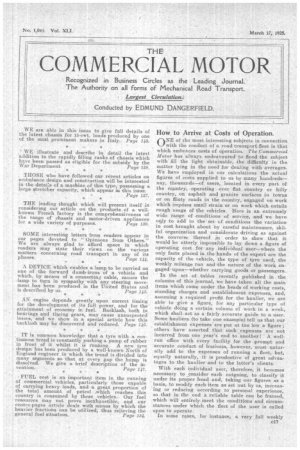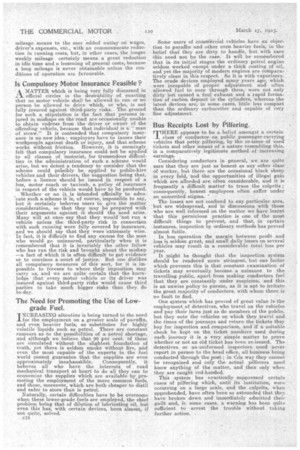How to Arrive at Costs of Operation.
Page 1

Page 2

If you've noticed an error in this article please click here to report it so we can fix it.
ONE of the most interesting subjects in connection with the conduct of a road transport; fleet is that which. embraces costs of operation. The Commercial Motor has always endeavoured to flood the subject with all the light obtainable, the difficulty in the matter lying in the need for dealing with averages. We have employed in our calculations the actual figures of costs supplied to us by many hundreds— nay, thousands—of users, located in every part of the country, operating over flat country or hilly country, on asphalt and granite surfaces in towns or on flinty roads in the country, engaged on work which imposes small strain or on work which entails rough usage of the vehicles. Here is an extremely wide range of conditions of service, and we have ott„ly to add to the set of conditions the variation in cost brought about by careful maintenance, skilful organization and considerate driving as against the converse thereof in order to show that it would be utterly impossible to lay down a figure of operating cost for any individual user—where the only facts placed in the hands of the expert are the capacity of the vehicle, the type of tyre used, the weekly mileage run and the nature of the work engaged upon—whether carrying goods or passengers.
In the set of tables recently published in the columns of this journal, we have taken all the main items which come under the heads of working costs, standing charges and establishment expenses, and, assuming a required profit for the haulier, we are able to give a figure, for any particular type of vehicle doing a certain volume of -work in a week, which shall act as a fairly accurate guide to a user. Some hauliers (to take one example) tell us that our establishment expenses are put at too low a figure ; others have asserted that such expenses are not incurred from one year's end to another! A wellrun office with every facility for the prompt and accurate conduct of business, however, must naturally add to the expenses of running a fleet, but, equally naturally, it is productive of great advantages to the haulier and to the latter's clients.
With each individual user, therefore, it becomes necessary to consider each outgoing, to classify it under its proper head and, taking our figures as a basis, to modify each item as set out by us, increasing or reducing according to personal experience, so that in the end a reliable table can be framed, which will entirely meet the conditions and, circumstances under which the fleet of the user is called upon to operate In some cues, for instance, a very full weekly ,e17 mileage means to the user added outlay on wages, driver's expenses, etc., with no commensurate reduction in sunning costs, but, in other cases, the longer weekly mileage certainly means a great reduction in idle time and a lessening of general costs, because a long mileage is never obtainable unless the conditions of operation are favourable.
Is Compulsory Motor Insurance Feasible ?
MATTER which is being very fully discussed in 11.. official circles is the desirability of enacting that no motor vehicle shall be allowed to run Or no person be allowed to drive which, or who, is not fully insured against third-party risks. The ground for such a stipulation is the fact that persons injured in mishaps on the road are occasionally unable to obtain redress from the driver or owner of the offending vehicle, because that individual is a " man of straw." It is contended that compulsory insurance is no new idea : employers have to insure their workpeople against death or injury, and that scheme works without friction. However, it is seemingly felt that compulsory insurance could not be applied to all classes of motorist, for tremendous difficulties in the administration of such a scheme would arise, but we detect a tendency to consider that the scheme could pasibly be applied to public-hire vehicles and their drivers,the suggestion being that, before a licence should be issued in respect of a bus, motor coach or taxicab, a policy of insurance in respect of the vehicle would have to be produced. Whether or no it is intended officially to advo
cate such a scheme it is, of course, impossible to say, but it certainly behoves users to give the matter consideration, so that they may be prepared with their arguments against it should the need arise. Many will at once say that they would not run a vehicle unless the third-party risk in connection with such running were fully covered by insurance, and we should say that they were 'extremely wise. In fact, it is difficult to find any excuse for the man who would go uninsured, particularly when it is remembered that it is invariably the other fellow who has run the risk and brought about the mishap —a fact of which it is often difficult to get evidence or to convince a court of justice. But one dislikes all compulsory measures of this sort, for it is impossible to foresee to where their imposition may carry us, and we are quite certain that the knowledge that every motor vehicle or its driver was jawed against third-party risks would cause third parties to take much bigger risks than they do to-day.
The Need for Promoting the Use of Lowgrade Fuel.
INCREASING attention is being turned to the need for the employment on a greater scale of paraffin, and even heavier fuels, as substitutes for highly volatile liquids such as petrol. There are constant rumours as to the possibilities of a petrol shortage, and although we believe that 90 per cent. of these are circulated without the slightest foundation of truth, yet there is seldom smoke without fire, and even the most capable of the experts in the fuel world cannot guarantee that the supplies are even approximately inexhaustible. Consequently, it behoves all who have' the interests of road
mechanical transport at heart to do all they can to _ economize the supplies which are available by promoting the employment of the more common fuels, and those, moreover, which are both cheaper to distil and safer to store than is petrol.
Naturally, certain difficulties have to be overcome when these lower-grade fuels are employed, the chief problem being that of dilution of lubricating oil, but even this has, with certain devices, been almost, if not quite, solved.
cis
Some users of commercial vehicles have an objection to paraffin and other even heavier fuels, in the belief that they are dirty to handle, but with care this need not be the case. It will be remembered that in its initial stages the ordinary petrol engine seldom worked except under a thick coating of oil, and yet the majority of modern engines are comparatively clean in this respect. So it is with vaporizers. The crude devices employed manyyears ago, which were incapable of proper adjustment and often allowed fuel to ooze through them, were not only dirty but caused a foul exhaust and a rapid formation of carbon deposit in the cylinders, whereas the latest devices are, in some cases, little less comp-act than the ordinary carburetter and capable of very fine adjustment.
Bus Receipts Lost by Pilfering.
THERE appears to be a belief amongst a certain class of conductor on public passenger-carrying vehicles that petty pilfering, by the re-issue of used tickets and other means of a nature resembling this, is a comparatively legitimate method of increasing earnings.
Considering conductors in general, we are quite sure that they are just as honest as any other class of worker, but there are the occasional black sheep in every fold, and the opportunities of illegal gain which are afforded are often considerable, and it is frequently a difficult matter to trace the culprits ; consequently, honest employees often suffer under an unmerited stigma.
The losses are not confined to any particular area, but are widespread, and in discussions with those who are well informed on the matter we have learnt that this pernicious practice is one of the most difficult things to prevent, and that, in certain instances, inspection by ordinary methods has proved almost futile.
In bus operation the margin between profit and loss is seldom great, and small daily losses on several vehicles may result in a considerable total loss per year.
It might be thought that the inspection system should be rendered more stringent, but one factor which prevents this is that constant examination of tickets may eventually become a nuisance to the travelling public, apart from making conductors feel that they are constantly under suspicion, and this is an unwise policy to pursue, as it is apt to irritate the great majority of conductors, with whom there is no fault to find.
One system which has proved of great value is the employment of detectives, who travel on the vehicles and pay their fares just as do members of the public, but they note the vehicles on which they travel and the times of the journeys and return the tickets they buy for inspection and comparison, and if a suitable check be kept on the ticket numbers used during each journey it is a very simple matter to prove whether or not an old ticket has been re-issued. The detectives or un-uniformed inspectors need never report in person to the head office, all business being conducted through the post ; in this way they cannot be recognized and only the actual pilferers need know anything of the matter, and then only when they are caught red-handed.
This system has practically suppressed certain cases of pilfering which, until its institution, were occurring on a large scale, and the culprits' when apprehended, have often been so astounded that they have broken down and immediately admitted their guilt and, in some cases, a warning has been quite sufficient to arrest the trouble without taking further action.
































